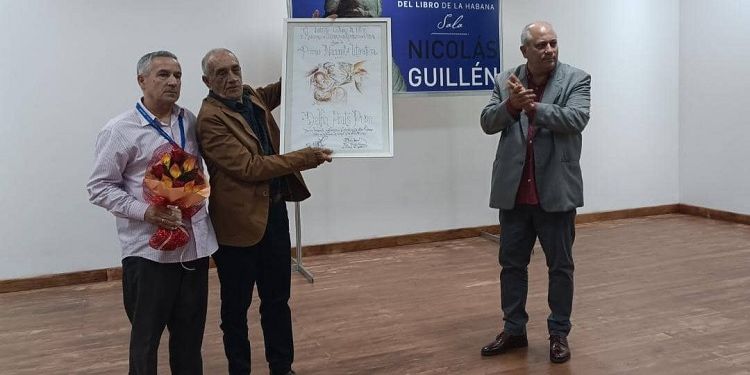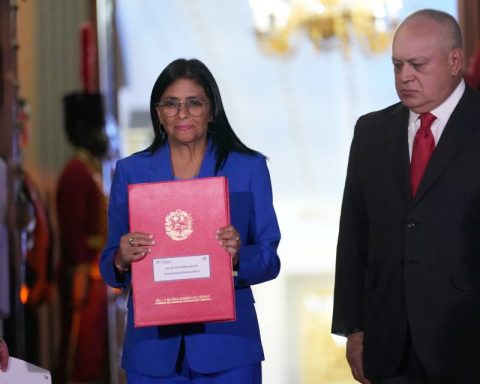Havana Cuba. – Silence can be compassionate, and also that silence that becomes great in front of the dirtiest, in front of the ineffable. Silence can be restorative. Silence, in the absence of courage, can be gallant. Someone assumed, I think Wittgenstein, that what could not be talked about was better to keep quiet. And what Wittgenstein was saying seems very obvious, but even so there are few who decide prudence and silence. Dolphin Prats, the most recent National Prize for Literature he opted for the quiet one, even when many expected otherwise. Delfin moved from silence to pretense…
The poet spread a cloak of silence over his truth. And it is that there are not a few who decide on infamy instead of making a complaint, even when they recognize that they could end up committed to evil, as is happening right now to the poet Delfín Prats. And perhaps fear is the great culprit behind Delfín’s new commitments, because I find it hard to believe that he forgot the many hoaxes that power has been dedicating to him for a long time. It is very unlikely that an intelligent man with a memory so easily forgets the many cruelties, the foolishness, that for so many years they dedicated to him.
Someone could argue that it was the hunger and homelessness that plagued Delfín for many years that made him fearful, but there is no guarantee that this sudden change will be lasting. Perhaps the fault was hunger and his many homelessness. What else could it be? What made Delfín decide to prostrate and kneel? Hunger? Was it fear? Whatever the reasons, there will be no way to move away, in memory minds, from that commitment to evil.
The Delfín case will be linked from now on, and forever, with the now distant in time, retraction of Heberto Padilla. “What cannot be talked about must be kept silent,” Wittgenstein warned us, but Delfín did not heed that warning. Delfín did not believe that the truth would be able to open the most closed night, and perhaps he even recognized it and was afraid. Dolphin must have been very afraid. Delfín feared the truth and above all its consequences. He must have feared the closed and black night that he already knows, that night in which it is not possible to see, not even, “a donkey three steps away”.
All of this must have been going through Delfín’s head while he was being awarded, at La Cabaña, the National Literature Award, that award that he had undoubtedly deserved for a long time, that award that I’ve been celebrating since CubaNet and also on social networks, after its final announcement. And even today I still believe that Delfín deserves the award or, to be more exact, I believe that his work deserves it, despite all the infamy that we saw later.
The most infamous thing would come later, and it happened at the delivery ceremony, that ceremony in which the bruised old poet listened to the praise of the essayist Cira Romero ―although she is better known by the nickname of “Cita Romero”, thanks to her great vocation to quote others to legitimize what he says or writes. And it is that Cita Romero, which is what I prefer to call her, has long collusions with power, perhaps since that time when she was married to Manuel Cofiño, that communist “puddle of blood” who wrote The last woman and the next fightamong other books of sad memory.
Most likely, Cita Romero was in charge of proposing the candidate Delfín Prats as a prize, and defending with nails and blood, to silence the many of us who were demanding his candidacy and the final prize. The atmosphere was heated, and nothing was better than appointing a jury more loyal to the ruling party than to literature. The “thing” was ugly, and it was better not to take risks. Cita Romero could be very useful as an intermediary. I think that’s how the prize should have been prepared…
This is how the great combat must have been; ditching, smoothing out rough edges, which is why they named Cita Romero, because the oven was not for cookies. This is how power works, doing the opposite of what is expected of it. The award for Delfín had already been decided, as was the ceremony and Delfín’s intervention, including his praise of the Revolution and Fidel Castro, to then pose next to Alpidio the anti-poet, that “minister hitter”the snatcher of “reckless” phones on that 27N.
It would be very sad then to face that image, televised, in which Alpidio and Delfín hold the prize, one on each side, the two separated by the prize. Sad that image from which Delfín Prats will never be able to separate himself. And wouldn’t it have been better if he turned his back on the prize? That could have happened, that could have been a dignified, irreproachable exit, but who am I to recommend such a thing?, and Delfín deserved, still deserves, the National Literature Award. What he should never have done were those praises to the regime established since 1959, and to Fidel Castro.
Today everything would be different for Delfín if he had rejected the prize, that prize that comes with a very brief aid of 2,400 pesos a month until the day of his death, but Delfín needed that figure, which, although very brief, most of the winners receive up to today, except Leonardo Padura, who tried to deliver that money every month to centers that shelter children without filial protection, but the power warned him that this money was aid and not part of the prize.
And now I wonder what would have happened if Delfín renounced the award, if he had at least desisted from mentioning Fidel Castro, from carantoñas to Alpidio Alonso and the Revolution. Delfín was able to make claims to the many mutes in the country, but he decided on the loa, the most shameful genuflectioninstead of remembering his friend Reinaldo Arenas, the friend of so many raids, but Delfín must have thought about hunger and the little help that now falls to him by decree.
Delfín, I think, had the commitment, like any good man, to recognize that old certainty of the existence of others, the very original idea of duty, the one that appears to us somewhat more clearly in the existence of a communist power, and that puts us in front of a horrendous moral postulate. He must have recognized his contemporaries, his faithful readers. The writer that is Delfín also has public functions that he should not have renounced, but he did. I prefer his “mute language”, his signs, rather than his praise of the communists.
OPINION ARTICLE
The opinions expressed in this article are the sole responsibility of the person who issues them and do not necessarily represent the opinion of CubaNet.

















